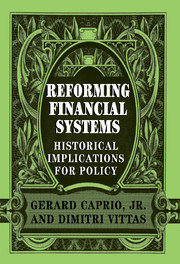Book contents
- Frontmatter
- Contents
- List of contributors
- Foreword
- 1 Financial history: Lessons of the past for reformers of the present
- 2 The evolution of central banking
- 3 Free banking: The Scottish experience as a model for emerging economies
- 4 Regulation and bank stability: Canada and the United States, 1870–1980
- 5 Deposit insurance
- 6 Contingent liability in banking: Useful policy for developing countries?
- 7 Universal banking and the financing of industrial development
- 8 Before main banks: A selective historical overview of Japan's prewar financial system
- 9 Thrift deposit institutions in Europe and the United States
- 10 The development of industrial pensions in the United States during the twentieth century
- 11 The rise of securities markets: What can government do?
- Index
7 - Universal banking and the financing of industrial development
Published online by Cambridge University Press: 25 March 2010
- Frontmatter
- Contents
- List of contributors
- Foreword
- 1 Financial history: Lessons of the past for reformers of the present
- 2 The evolution of central banking
- 3 Free banking: The Scottish experience as a model for emerging economies
- 4 Regulation and bank stability: Canada and the United States, 1870–1980
- 5 Deposit insurance
- 6 Contingent liability in banking: Useful policy for developing countries?
- 7 Universal banking and the financing of industrial development
- 8 Before main banks: A selective historical overview of Japan's prewar financial system
- 9 Thrift deposit institutions in Europe and the United States
- 10 The development of industrial pensions in the United States during the twentieth century
- 11 The rise of securities markets: What can government do?
- Index
Summary
In this chapter I address three questions about universal banking. First, what is universal banking? Second, why might universal banking be an effective organizational structure for a banking system, particularly in a newly industrializing economy? Third, what is the evidence supporting or contradicting the view that universal banking reduces corporate financing costs for a newly industrializing economy?
I define universal banking as a banking system made up of large-scale banks that operate extensive networks of branches, provide many different services, hold several claims on firms (including equity and debt), and participate directly in the corporate governance of the firms that rely on the banks as sources of funding or as securities underwriters. That is an encompassing and therefore narrow definition of universal banking. But it suits my purposes. I will examine the pre–World War I universal banking system in Germany – which satisfies my narrow definition – and explore the synergies among the different elements in my definition.
To answer the question of whether universal banking reduces corporate financing costs, I will contrast the cost of financing industrialization in the United States and in Germany during the second industrial revolution (roughly 1870–1913). This period is important to examine for two reasons. First, the second industrial revolution involved large-scale production and distribution activities (emphasized by Chandler 1977), which brought a new challenge to financial markets – the rapid financing of very large minimumefficient- scale industries. Because large-scale production is typical of modern industrial practice, I think that the lessons from the second industrial revolution are broadly applicable to contemporary developing countries.
- Type
- Chapter
- Information
- Reforming Financial SystemsHistorical Implications for Policy, pp. 113 - 127Publisher: Cambridge University PressPrint publication year: 1997
- 3
- Cited by



